Omicron: WHO warns COVID variant risk ‘very high’
UN agency says based on early evidence there was a possibility of new surges that could lead to ‘severe consequences’.
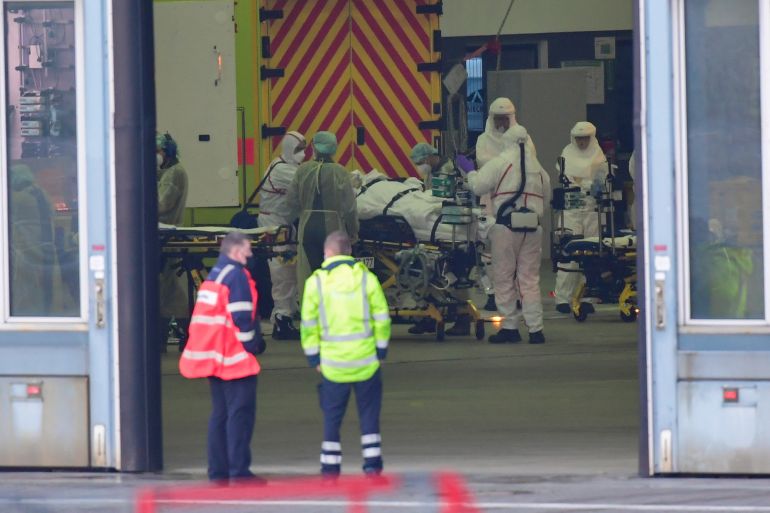
A three-day special session of the World Health Assembly (WHA) kicked off on Monday to discuss pandemic preparedness and response, amid concerns about the spread of the new Omicron variant.
The WHA normally meets in May but a special session was called for in a decision adopted by the World Health Organization member states.
Keep reading
list of 3 itemsAsian markets stabilise amid uncertainties over Omicron variant
Japan to bar all foreign visitors over Omicron variant
A draft resolution currently under review stops short of calling for the establishment of a “pandemic treaty” or a “legally binding instrument”, which proponents say would beef up the international response to pandemics.
The WHO has warned against countries hastily imposing travel curbs. However, bans have been introduced in recent days including by the United Kingdom, the European Union and the United States.
This live blog is now closed. These were Monday’s updates:
Hospitalisations in Michigan surge
Michigan’s number of hospitalised adults with confirmed COVID-19 cases reached a new pandemic high of nearly 4,200 as the state continued to confront surging infections.
The total of 4,181 surpassed the previous record of 4,158, which was set seven months ago during the state’s third wave.
Only Minnesota had a higher seven-case case rate than Michigan as of Sunday, according to the Centers for Disease Control and Prevention.
State health officials are urging people to get vaccinated and to wear masks in public settings to limit the spread of the coronavirus amid the fourth surge. The federal government has deployed military medical staffers to help Michigan hospitals cope.
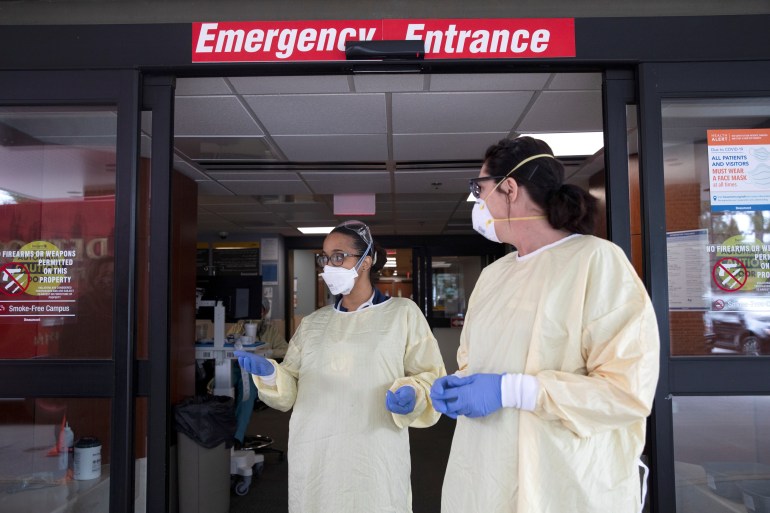
Cuba tightens restrictions on eight African nation
Cuba will ratchet up restrictions from December 4 on passengers from certain African countries over concerns about the Omicron coronavirus variant, the country’s Communist-run government said on Monday.
Travellers arriving from South Africa, Botswana, Lesotho, Eswatini, Zimbabwe, Namibia, Malawi, and Mozambique will be allowed to enter Cuba, the country’s health ministry said, but will be required to comply with multiple precautionary measures, including proof of vaccination, three PCR tests and a seven-day quarantine.
France reports biggest jump in hospital patients since spring
France registered its biggest jump in coronavirus-related hospital admissions since the spring, health ministry data showed.
The number of patients in intensive care units with COVID-19 jumped by 117 to 1,749 people, the biggest increase since March-April, when the ICU number rose by more than 100 per day on several days.
The French health minister last week said that France has entered a fifth wave of the COVID-19 epidemic.
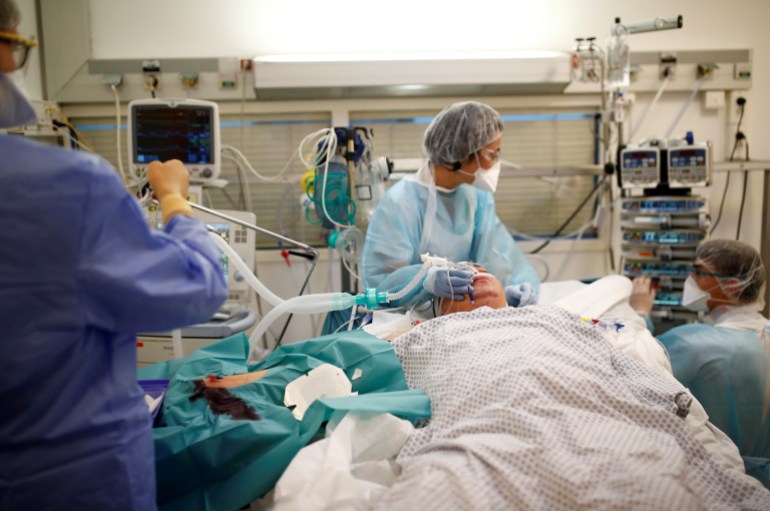
WHO warns that new virus variant poses ‘very high’ risk
The World Health Organization says the global risk from the Omicron variant of the coronavirus is “very high” based on early evidence, and it could lead to surges with “severe consequences”.
The UN health agency, in a technical memo to member states, says “considerable uncertainties” remain about the new variant that was first detected in southern Africa. But it says the likelihood of possible further spread around the world is high.
Canada’s Quebec province discovers first case of Omicron
Quebec has discovered its first case of the COVID-19 Omicron variant, the Canadian province’s health minister said on Monday, bringing Canada’s total number of cases to three.
Quebec Health Minister Christian Dube also told reporters at a briefing that 115 travellers from countries affected by the new variant, primarily South Africa, were called and asked to take a new PCR test for COVID-19.
Omicron ‘not a cause for panic’: Biden
President Joe Biden in a televised address from the White House said the Omicron coronavirus strain “is a cause for concern, not a cause for panic”.
“We have more tools today to fight the variant than we’ve ever had before,” he said, while adding that his chief medical adviser Anthony Fauci expected current vaccines would remain protective, with boosters enhancing protection.
The US president appealed to the roughly 80 million unvaccinated Americans aged five and up to get their shots, and for the rest of the country to seek out booster shots six months after their second dose.
Biden also urged Americans to get back to wearing face masks in all indoor public settings – a pandemic precaution that has fallen out of use across much of the country.
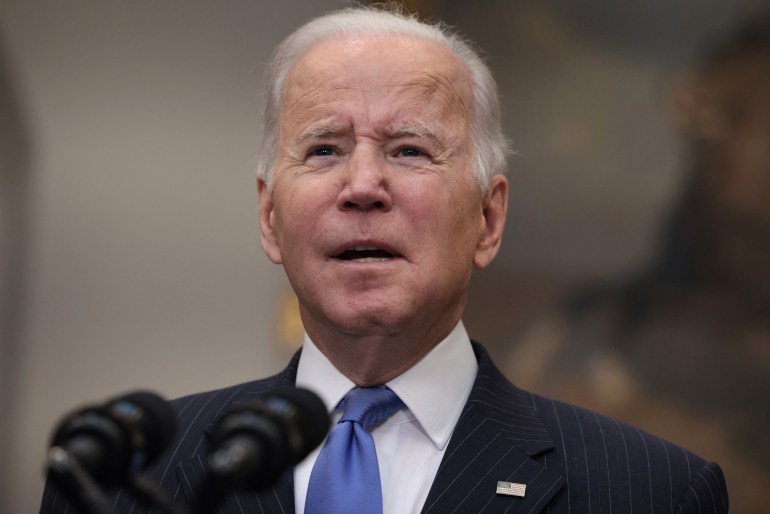
Sweden reports first confirmed case of Omicron
One case of the Omicron coronavirus variant has been detected in Sweden, the Public Health Agency said.
The case was detected in a test taken just more than a week ago from a person who had travelled from South Africa, the agency said in a statement.
Omicron: Are gov’ts prepared to deal with a new COVID variant?
Countries around the world have reimposed travel restrictions in response to the new Omicron variant.
They were starting to reopen their borders and lift COVID-19 restrictions. But a new variant is now threatening to derail the progress made in the past few months.
Several nations have already imposed travel restrictions to and from Southern Africa, where the Omicron variant was first detected.
Watch here.
UN’s Guterres ‘deeply concerned’ by curbs on Southern Africa
UN Secretary-General Antonio Guterres said on Monday he was “deeply concerned” as countries around the world imposed travel restrictions on Southern Africa in an attempt to stop the spread of a worrying new COVID-19 variant discovered there.
“The people of Africa cannot be blamed for the immorally low level of vaccinations available in Africa – and they should not be penalized for identifying and sharing crucial science and health information with the world,” the UN chief said in a statement.
“I am now deeply concerned about the isolation of southern African countries due to new Covid-19 travel restrictions,” Guterres added.
Spain detects first case of Omicron variant
Spain has detected its first case of the Omicron variant of the coronavirus in a traveller coming from South Africa, Spanish newspaper El Pais reported.
The case of the new variant was sequenced by Madrid’s Gregorio Maranon hospital, according to a tweet by its microbiology unit, adding that the patient was in fair condition.
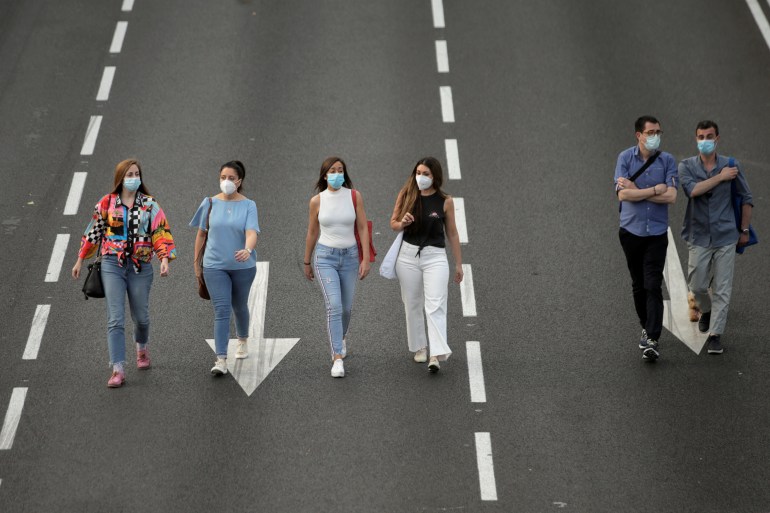
Moderna says Omicron vaccine could be ready by early 2022
Moderna Inc is having its best two-day rally in a year after the company said a new vaccine to fight the Omicron strain of the coronavirus could be ready by early 2022 if required.
The stock soared as much as 14 percent to the highest level in two months, after jumping 21 percent during Friday’s global risk-asset sell-off, to reclaim its place as top performer on the S&P 500 year to date. The company mobilised hundreds of workers on Thanksgiving Day last Thursday in order to start work on Omicron, Chief Medical Officer Paul Burton said during the weekend.
Read more here.
US stocks rebound after Friday’s Omicron-fuelled sell-off
The major stock indexes in the United States rebounded on Monday after fears about the potential economic effects of the Omicron COVID-19 variant triggered a steep sell-off on Friday.
At the opening bell, the Dow Jones Industrial Average jumped 118 points or 0.34 percent at 35,017.71, according to Refinitiv data.
Read more here.
‘Highly transmissible’ Omicron requires ‘urgent action’: G7
The Omicron variant is highly transmissible and requires “urgent action,” G7 health ministers said, while applauding South Africa’s “exemplary work” for both detecting the strain and alerting others to it.
“The global community is faced with the threat of a new, at a first evaluation, highly transmissible variant of COVID-19, which requires urgent action,” the health ministers said in a statement following an emergency meeting.
Underlining the “strategic relevance of ensuring access to vaccines”, they pledged to hold to their donation commitments, as well as to provide support to research and development.
UK vaccine advisers say all adults to receive boosters
The United Kingdom will offer a COVID-19 booster vaccine to all adults and give second doses to children aged between 12 and 15, the UK’s top vaccine advisers said on Monday, accelerating shots in light of concern about the spread of the Omicron variant.
The Joint Committee on Vaccination and Immunisation said that all adults between 18-39 years old could receive shots, extending a programme that is already open for over 40s.
“Having a booster dose of the vaccine will help to increase our level of protection against the Omicron variant,” said Wei Shen Lim, the JCVI’s Chair for COVID-19 immunisation.
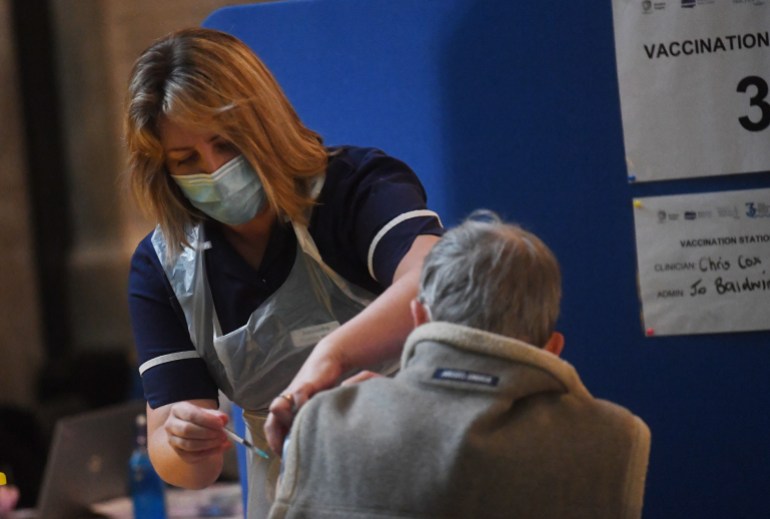
Dutch find 14 Omicron cases among passengers from South Africa
Netherlands health authorities say they have found another case of the new Omicron COVID-19 variant among passengers arriving from South Africa, bringing the total to 14.
“With the help of sequencing, it has now been confirmed in 14 people that it is the Omicron variant,” Health Minister Hugo de Jonge said in a letter to parliament.
De Jonge had on Sunday announced 13 Omicron infections. They were among 61 passengers who were confirmed with coronavirus, out of 624 travellers who arrived in Amsterdam on two KLM flights from South Africa on Friday.
Biden to provide update on Omicron, US response: AJ correspondent
United States President Joe Biden is expected to give a speech on Monday to address the Omicron variant and measures required to curb its spread.
“What we expect is that the president will be urging the 80 million Americans still not vaccinated to get vaccinated, to get a booster,” Al Jazeera’s correspondent Kimberley Halkett reported from the White House.
“But what we think is the president will stop short of putting in place further travel restrictions with respect to international travel as well as domestic travel,” she added.
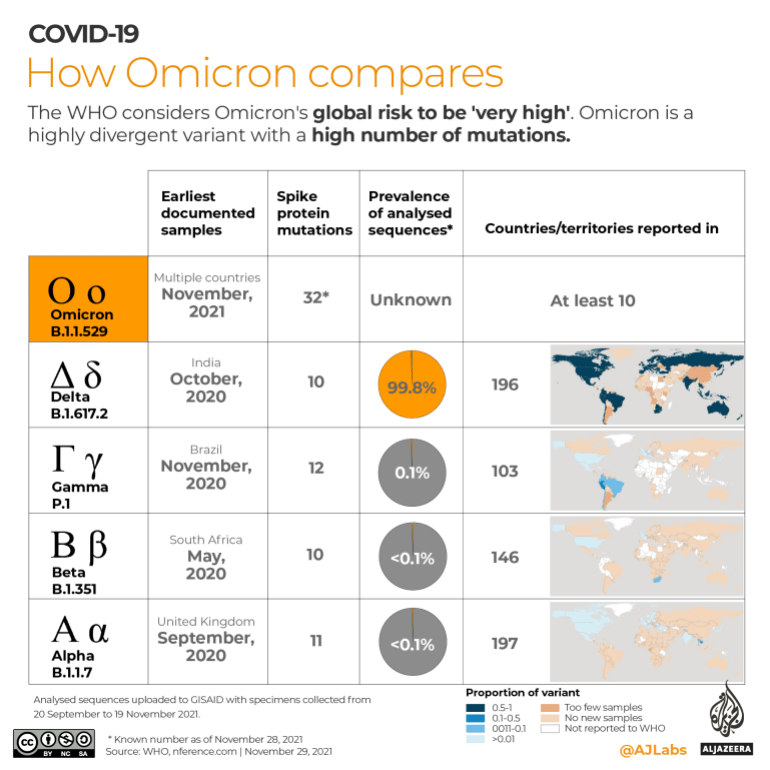
Poland announces new curbs amid Omicron concerns
Poland said it would ban flights to seven African countries, extend the quarantine period for certain travellers and reduce limits on numbers allowed into places like restaurants.
“We must appreciate the importance of this phenomenon and the risk that a new mutation emerging poses,” Health Minister Adam Niedzielski told a news conference.
China’S Xi pledges 1bn Covid vaccine doses for Africa
President Xi Jinping has offered one billion coronavirus vaccine doses to Africa, in a speech made via videolink to a China-Africa summit in Senegal’s capital Dakar.
The Chinese leader said that his country would donate 600 million doses directly. Meanwhile, a further 400 million doses would come from other sources.
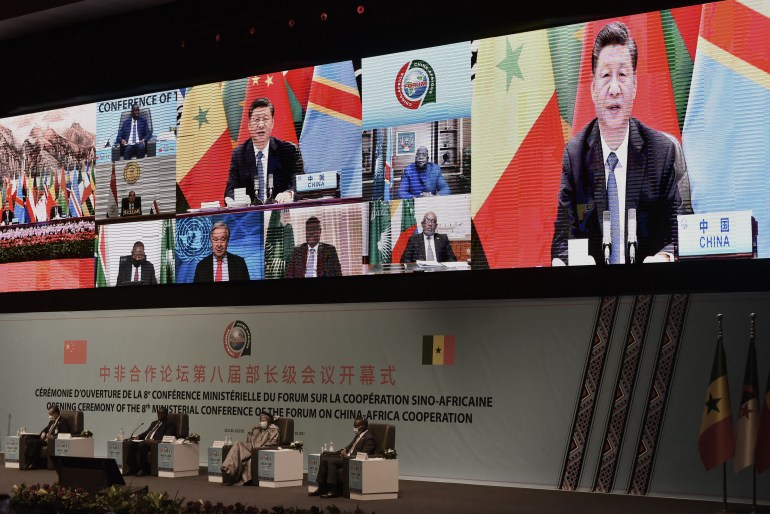
Ukraine orders self-isolation for travellers from countries with Omicron cases
Ukraine has introduced mandatory 14-day self-isolation for travellers returning from countries where the Omicron variant of COVID-19 has been detected, the health ministry said.
“Travellers who have spent more than seven days in the Republic of South Africa, the Republic of Botswana, Zimbabwe, Namibia, the Kingdom of Lesotho, the Kingdom of Eswatini, and the Republic of Mozambique must complete 14 days of self-isolation,” it said in a statement, adding that the list would be expanded soon.
Health Minister Viktor Liashko told a televised briefing earlier on Monday that cases of the Omicron variant had not been registered in Ukraine yet.
Vaccines should give good protection against Omicron: South African expert
Existing COVID-19 vaccines should be highly effective at preventing severe disease and hospitalisation from the newly identified Omicron variant, a top South African infectious disease expert said.
Professor Salim Abdool Karim, who served as the government’s chief adviser during the initial response to the pandemic, also said it was too early to say whether Omicron led to more severe clinical symptoms than previous variants.
However, he said it did appear more contagious and more likely to infect people with immunity from vaccination or prior infection, and he was expecting it to drive new daily infections in the country above 10,000 before the end of the week, from 2,858 on Sunday.
“Based on what we know and how the other variants of concern have reacted to vaccine immunity, we can expect that we will still see high effectiveness for hospitalisation and severe disease, and that protection of the vaccines is likely to remain strong,” Abdool Karim told a news conference.
Preventing severe disease is mainly a function of T-cell immunity, different from the antibody immunity that often blocks infections, “so even if there’s some escape from antibodies it’s very hard to escape T-cell immunity”, he said.
South Africa says travel ban by African nations ‘regrettable’
South Africa says it is “regrettable” that fellow African nations have joined a rush to impose travel bans over the new Omicron variant.
“It is quite regrettable, very unfortunate, and I will even say sad, to be talking about travel restrictions imposed by a fellow African country,” foreign ministry spokesman Clayson Monyela said on Monday.
Angola, Mauritius, Rwanda and the Seychelles have halted flights from South Africa in a bid to shield themselves from the spread of the new COVID-19 variant.
Monyela said South Africa had recently made “substantial donations” of vaccines to some of the countries that were now imposing flight bans.
“When a fellow African country does that, especially in the context where most of these countries are beneficiaries … it doesn’t make sense,” he told an online news conference organised by the health ministry.
“That’s why we think these decisions must be reversed immediately.”
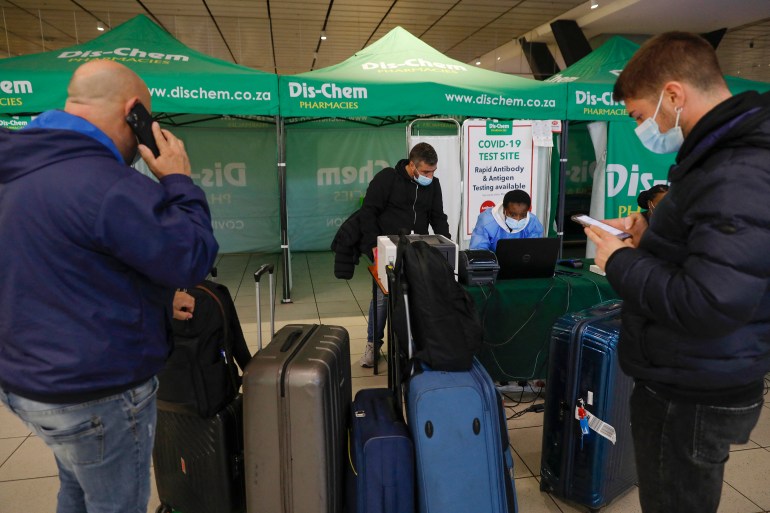
Portugal probes local transmission of Omicron among football team
Portuguese health authorities have identified 13 cases of Omicron among members of a top football club and have ordered those who have been in contact with the positive cases to isolate and be regularly tested.
The national health institute said on Monday that one of those who tested positive was a player from the Lisbon-based Belenenses SAD football club who had recently been to South Africa, where Omicron was first identified. The others had not travelled to South Africa.
Portuguese health authorities are investigating whether this is one of the first cases of local transmission outside of Southern Africa.
Portugal also found two positive coronavirus cases when it screened 218 passengers arriving in Lisbon from the capital of Mozambique on Saturday. One of the cases was the Delta variant and the other one could not be established, authorities said.
WHO chief calls for ‘legally binding’ agreement to help prevent future pandemics
The WHO chief says the spread of Omicron is a “test of our collective ability to respond to future pandemics” and called for a “legally binding” agreement to coordinate collective action.
Tedros Adhanom Ghebreyesus told the WHA opening session: “Omicron demonstrates just why the world needs a new accord on pandemics,” adding that “courageous and compassionate leadership” and an “unshakeable commitment to solidarity” will be fundamental.
Tedros said “our current system disincentivises countries from alerting others to threats that will inevitably land on their shores” after many countries announced travel restrictions to and from Southern Africa.
He also criticised the inequitable distribution of vaccines, saying access for all was necessary to limit the spread of the virus and its mutations.
Germany’s Angela Merkel calls for funding increase to WHO
German Chancellor Angela Merkel has called for a 50-percent increase in funding to the WHO.
Speaking at the opening session of the WHA, Merkel called for a binding international accord on preventing pandemics.
Germany’s outgoing chancellor added that a global approach was needed to prevent the spread of a virus that “knows no borders”.
South Africa ramping up to cope with Omicron
South Africa’s Health Minister Joe Phaahla says the government is doing everything possible to prepare health facilities to cope with Omicron and scientists are working to establish whether it is more transmissible and whether vaccines can protect against severe illness.
Phaahla also said, at the news conference on Monday, officials are engaging with countries that imposed travel restrictions on Southern African countries to try to get them to reverse them.
South African epidemiologist Salim Abdool Karim also said on Monday that not enough data had been collected to determine the clinical implications of Omicron compared with previous variants, and that reinfections are likely but that vaccinated people had less probability of developing serious symptoms.
“Based on what we know and how the other variants of concern have reacted to vaccine immunity, we can expect that we will still see high effectiveness for hospitalisation and severe disease, and that protection of the vaccines is likely to remain strong,” Abdool Karim told a news conference.
WHO says Omicron poses ‘very high’ global risk, countries must prepare
The WHO says “the overall global risk related to … Omicron is … very high” and that it is likely to spread internationally with “severe consequences” in some areas.
In technical advice to its 194 member states, the UN health agency on Monday urged them to accelerate the vaccination of high priority groups and to “ensure mitigation plans are in place” to maintain essential health services.
Further research is needed to better understand Omicron’s potential to evade the immunity induced by vaccines and previous infections. More data is expected in the coming weeks.
WHO update on Omicron, the new #COVID19 variant of concern: What we know & what we don't https://t.co/OVSKb74pHd
— World Health Organization (WHO) (@WHO) November 28, 2021
Six cases of Omicron identified in Scotland
Six cases of Omicron have been identified in Scotland, the Scottish government says, adding that public health officials are working to investigate.
Scottish First Minister Nicola Sturgeon said at a news conference on Monday that not all of the identified cases had a recent travel history or known links with others who have travelled to the countries in Southern Africa where the variant was originally detected.
“This suggests that there might already be some community transmission of this variant in Scotland,” Sturgeon said. “But again, let me stress, there is no evidence yet that this is sustained, nor any evidence from the enhanced surveillance that it is widespread at this stage.”
UK to unveil new booster guidance as Omicron spreads
The United Kingdom is set to unveil new guidance on extending the rollout of COVID-19 booster shots to those under 40 on Monday, in light of the rapid spread of Omicron.
Prime Minister Boris Johnson has restricted travel to Southern Africa, tightened testing rules and made mask-wearing compulsory in shops and on transport.
He also asked the Joint Committee on Vaccination and Immunisation to urgently review boosters for under-40s, and look at reducing the gap between second doses and boosters.
The UK, which currently holds the G7 presidency, has called for an emergency meeting on Monday to discuss the new COVID strain.
Dr Angelique Coetzee: Omicron causing ‘very mild symptoms’ in people who are vaccinated
Dr Angelique Coetzee, who first spotted the new COVID-19 variant in South Africa, says that so far, people infected with Omicron have “very mild symptoms”, especially those who were inoculated after August.
Coetzee, of the South African Medical Association, said Omicron had raised concerns due to its more than 30 mutations, which might hinder vaccine effectiveness.
While it might take weeks for scientists to understand the implications of the new variant, hospital admissions in South Africa remain low, raising hopes that the new variant will not lead to increased hospitalisation rates.
Speaking to Al Jazeera’s Fahmida Miller, Coetzee said the travel bans imposed on South Africa were “extremely premature”.
Dutch police arrest couple attempting to flee quarantine for Spain
Dutch police have arrested a married couple attempting to flee the country after testing positive for COVID-19. It was unclear whether the couple had tested positive for Omicron.
The Spanish man and Portuguese woman had left a quarantine hotel and were trying to fly to Spain. They were arrested “in an aeroplane that was about to depart”, the military police said in a statement.
Dozens of passengers who tested positive for COVID-19 after arriving on two flights from South Africa on Friday are being kept in quarantine at a hotel near Amsterdam’s Schiphol airport.
Singapore, Malaysia reopen land border
Singapore and Malaysia have reopened one of the world’s busiest land borders, allowing vaccinated travellers to cross after nearly two years of being shut due to the pandemic and amid concerns the border might close again due to Omicron.
Under the latest arrangement, up to 1,440 travellers from either side can cross the land border per day without quarantine, if they hold citizenship, permanent residency or long-term visas in the destination country.
Travel requirements include testing negative for COVID-19 before departure and an on-arrival test. Malaysia’s Health Minister Khairy Jamaluddin said a traveller had tested positive to a rapid antigen test, and that some COVID cases were inevitable.
Singapore blocks Middle East airlines
Singapore has deferred the start of vaccinated travel lanes with Middle Eastern countries, such as Qatar, Saudi Arabia and the United Arab Emirates, in view of their role as “transport nodes” for affected countries, its health ministry says.
US scientist Fauci defends travel ban on African countries
US infectious diseases expert, Dr Anthony Fauci, has defended the Biden administration’s travel restrictions in response to Omicron.
The US plans to ban travel from South Africa and seven other Southern African countries starting from Monday. Fauci stressed the purpose of any travel ban was to buy time to ramp up preparedness, urging not to let the measure “go without a positive effect”.
First suspected case of Omicron detected in Switzerland
Switzerland’s first probable Omicron case has been detected, as the country tightens its entry restrictions to check the spread.
The case is a person who returned to Switzerland from South Africa a week ago, the Federal Office for Public Health said on Twitter. Testing will clarify the situation in the coming days, it added.
Switzerland has said travellers from 19 countries must present a negative test when boarding a flight to the country and must quarantine for 10 days on arrival. The list includes Australia, the UK, the Czech Republic, Denmark, Israel, and South Africa.
New variant not stopping New Zealand reopening
The emergence of Omicron has not changed New Zealand’s plans to ease restrictions in Auckland and move into a new, more open phase of its pandemic response, Prime Minister Jacinda Ardern says.
Bars, restaurants and gyms in Auckland can reopen from late Thursday, ending a coronavirus lockdown that began in August.
Around the country, a new “traffic light” system will bring an end to lockdowns, but people will need to be fully vaccinated in order to do anything from getting a haircut to watching a concert.
Japan to bar foreign arrivals over virus variant
Japan says it will bar entry to foreigners, joining Israel in the strictest border measures yet since the discovery of Omicron.
Tokyo already announced it would require travellers permitted to enter Japan from six Southern African countries to quarantine in government-designated facilities for 10 days on arrival.
Japan’s borders have been almost entirely shut to overseas visitors for most of the pandemic, with even foreign residents at one point unable to enter.
No Omicron cases have been detected in the country so far. One traveller from Namibia tested positive for the coronavirus, and further tests were being conducted to find out if it was from the new variant, Health Minister Shigeyuki Goto said.
Read the previous live blog here